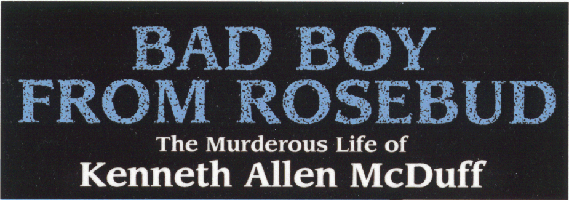



**An Exclusive for the Rosebud News**
Why Write About Kenneth McDuff?
 One of the burdens
of writing history is to assure the victory of history over its primary
enemy – folklore. The Kenneth McDuff story is a case in point. The story,
known all too well to the people of Rosebud, is one of profound sadness
and horror. In some ways Rosebud is one of McDuff’s victims: writers, journalists,
researchers, and TV news crews have come here because of Kenneth Allen
McDuff, not because it is a nice little town populated by decent people.
I can think of few things so unjust. The good people of Rosebud have a
right to ask what the young son of one of McDuff’s victims asked me recently:
"Why would someone want to write a book about Kenneth McDuff?"
I wish my answer had not been so clumsy. (And this was the second time
this had happened; Dr. Albert Lalonde of Austin asked me the same question
about Charles Whitman, and I was equally clumsy.) I explained to the little
boy that we know light exists only because there is darkness, and darkness
exists only because there is light – one does not exist without the other.
So it is with good and evil. We must study both. Good people must prevail
over bad people; knowledge must prevail over ignorance; and history must
prevail over folklore.
One of the burdens
of writing history is to assure the victory of history over its primary
enemy – folklore. The Kenneth McDuff story is a case in point. The story,
known all too well to the people of Rosebud, is one of profound sadness
and horror. In some ways Rosebud is one of McDuff’s victims: writers, journalists,
researchers, and TV news crews have come here because of Kenneth Allen
McDuff, not because it is a nice little town populated by decent people.
I can think of few things so unjust. The good people of Rosebud have a
right to ask what the young son of one of McDuff’s victims asked me recently:
"Why would someone want to write a book about Kenneth McDuff?"
I wish my answer had not been so clumsy. (And this was the second time
this had happened; Dr. Albert Lalonde of Austin asked me the same question
about Charles Whitman, and I was equally clumsy.) I explained to the little
boy that we know light exists only because there is darkness, and darkness
exists only because there is light – one does not exist without the other.
So it is with good and evil. We must study both. Good people must prevail
over bad people; knowledge must prevail over ignorance; and history must
prevail over folklore.
It is hard to imagine Kenneth McDuff becoming a folk hero, and yet, our history is replete with folklore making heroes out of criminals. That happens when folklore replaces history. Consider Jesse James, Billy the Kid, Bonnie and Clyde, and closer to home, Sam Bass and Wild Bill Longley. (Only last month the Smithsonian Institution participated in the exhumation of Wild Bill Longley in Giddings.) Myths have supplanted the truth about their evil ways. All of them have streets, buildings, stores, movies, and even festivals named after them, and their graves are significant tourist attractions. Through the years nearly all of them have had impostors claiming to be "the real thing." Some, like Jesse James and Bill Longley, have been exhumed for DNA testing to settle bitter feuds between "rightful heirs" to a romantic legacy. In those cases, historians failed us; they allowed us to forget those people were murderers.
The glorification of criminals should be an affront to a responsible historian. For example, while visiting the "Billy the Kid Gift Shop" in New Mexico, my son Mark gazed at a poster of The Kid and observed that "he was pretty ugly." The cashier countered that the Kid was actually "quite handsome" and that "he had a way with the girls." Had this person been taught her history, she would have known that Billy the Kid was a cattle rustler and a murderer. But, we all have folklore we cherish; replacing it with history takes courage. Such is the burden of writing history.
More recently, T-shirts with Charles Whitman’s picture on them have been produced and sold in Austin. Other T-shirts have Charles Manson’s image, and rock groups have actually recorded his songs. That is why we must not presume that generations from now there will not be a McDuff Legend. Even before he was re-arrested, re-tried, re-convicted, re-sentenced, re-tried, re-convicted, and re-sentenced for two more capital murder charges, a corporation called "Justice for McDuff" had been formed for the purpose of making a movie based on the McDuff story. Some of the officers of this corporation firmly believed that Kenneth would never take drugs much less commit murder. The proposed film had as its premise the idea that he had been framed for a triple murder in 1966 and was unjustly sent to prison for 23 years.
 Finally, whether we like it or not, Kenneth Allen McDuff made history.
His brutality and heartlessness made us, as Texans, face the utter failure
of our criminal justice system. It was McDuff who made us build $1.5 billion
worth of prisons, so that now we have the largest prison system in the
history of the free world; it was McDuff who solidified our devotion to
capital punishment; and it was McDuff who was (and still is) very likely
the most expensive criminal in American history. We paid dearly, in more
ways than one, for preferring to believe there were no Kenneth Allen McDuffs.
The shear enormity of his evil forced much-needed reforms on three governors
and the State Legislature, something no conceivable coalition could ever
have done through a normal political process.
Finally, whether we like it or not, Kenneth Allen McDuff made history.
His brutality and heartlessness made us, as Texans, face the utter failure
of our criminal justice system. It was McDuff who made us build $1.5 billion
worth of prisons, so that now we have the largest prison system in the
history of the free world; it was McDuff who solidified our devotion to
capital punishment; and it was McDuff who was (and still is) very likely
the most expensive criminal in American history. We paid dearly, in more
ways than one, for preferring to believe there were no Kenneth Allen McDuffs.
The shear enormity of his evil forced much-needed reforms on three governors
and the State Legislature, something no conceivable coalition could ever
have done through a normal political process.
While appearing on K-EYE News, a CBS affiliate in Austin, Rosenda Rios asked me why I am bringing more attention to Kenneth McDuff. That, too, is a fair question and the answer is equally simple: As someone who loves history, I have no choice, and all I can do is assure the people of Rosebud, and a little boy who no longer has his mother to raise him, that I will write history, not contribute to folklore, and that McDuff richly deserves the kind of attention I will give him.
| Gary's Bio |Before Brown| Worse Than Death| Bad Boy From Rosebud | Sniper in the Tower | Cajuns |